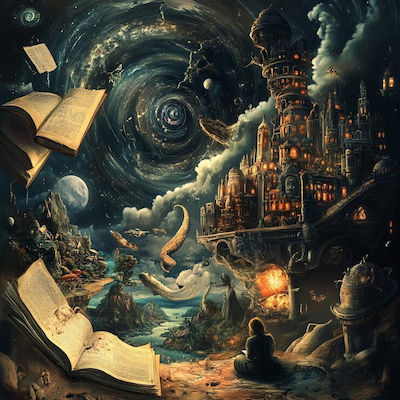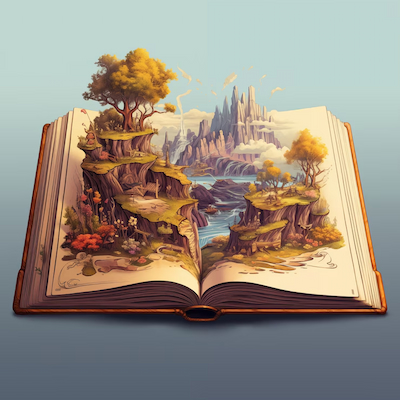
Fantastic literature is a genre that transcends the boundaries of reality, allowing readers to explore parallel universes filled with mythical creatures, epic heroes, and narratives that defy logic. From fairy tales to epic fantasy sagas, this genre has the power to transport readers to worlds where imagination knows no limits. This literary art form not only entertains but also provokes deep reflections on the human condition, using myths and metaphors as tools to explore universal themes.
In the context of fantastic literature, myths and metaphors play a crucial role in constructing meaning and creating immersive atmospheres. They are the foundation upon which narratives are built, giving life to characters and settings that, although often impossible, resonate with human experiences. Through their stories, authors have the ability to question reality and establish dialogues between the real and the imaginary, creating a space where the extraordinary becomes part of everyday life.
How Epic Narratives Work in Fantastic Literature
Epic narratives in fantastic literature operate through a rich and complex narrative structure, often involving the hero’s journey. This concept, popularized by Joseph Campbell, describes the path of a protagonist who faces challenges and adversities in pursuit of a greater goal. This journey is not only physical but also emotional and spiritual, allowing the reader to connect with the character on a deeper level. Through trials and tribulations, the hero discovers not only their abilities but also their identity and purpose.
Another fundamental aspect of epic narratives is the construction of a detailed and cohesive world. Authors of fantastic literature dedicate time and effort to creating universes that, although fictional, have internal rules and their own logic. This world-building involves defining geography, culture, history, and systems of magic, all essential for the narrative’s credibility. A well-crafted world enriches the story and allows readers to become fully immersed in the experience.
Additionally, epic narratives often incorporate elements of conflict, whether between characters, good and evil, or internal struggles. These conflicts are essential for plot development and character evolution. The tension generated by these dramatic situations keeps the reader engaged, creating anticipation about how the challenges will be overcome and what lessons will be learned along the way.
Finally, epic narratives in fantastic literature also use symbolism and universal themes that resonate with the human experience. Themes such as love, sacrifice, friendship, and the fight for justice are often explored, allowing readers to reflect on their own lives and values. This ability to connect the extraordinary with the everyday is one of the reasons why fantastic literature continues to captivate and inspire readers of all ages.

Advantages of Exploring Myths and Metaphors in Fantastic Literature
Exploring myths and metaphors in fantastic literature offers a range of advantages that enrich both the author’s and reader’s experiences. Firstly, myths act as a bridge between different cultures and eras, allowing authors to make references that resonate with a broad audience. By incorporating mythological elements, writers create a sense of familiarity and connection, even in narratives set in entirely different worlds.
Moreover, metaphors are powerful tools that allow authors to express complex ideas in accessible ways. Through vivid imagery and comparisons, writers can convey emotions, concepts, and experiences that might be difficult to articulate in literal terms. This richness of language not only beautifies the text but also provokes deeper reflection from the reader, who is invited to interpret and find hidden meanings between the lines.
Another benefit of exploring myths and metaphors is the ability to address universal themes in innovative ways. Fantastic literature allows authors to deal with issues such as the battle between good and evil, the search for identity, and the nature of reality, using fantasy as a vehicle to discuss the human condition. This approach enriches the narrative and provides an opportunity for readers to reflect on their own lives and experiences.
Finally, the exploration of myths and metaphors in fantastic literature also opens space for creativity and innovation. Authors have the freedom to reinterpret classical stories, create new legends, and develop characters that challenge established norms. This creative freedom results in unique and engaging narratives, inspiring new writers to explore their own voices and worldviews.
How to Create Imaginary Worlds in Fantastic Literature
Developing Characters and Mythical Creatures: Creating memorable characters is essential for any narrative, especially in fantastic literature. Authors must take time to develop complex and three-dimensional characters with clear motivations and a development arc. Additionally, the inclusion of mythical creatures, inspired by folklore and mythology, can add an extra layer of fascination and mystery to the story, enriching the created universe.
Building Parallel Worlds with Magical Realism: Magical realism is a technique that combines fantastic elements with everyday reality. By building parallel worlds that subtly incorporate the extraordinary, authors can create a unique and immersive atmosphere. This approach allows readers to accept magic as part of everyday life, making the narrative more accessible and impactful.
Incorporating Literary Symbolism in Stories: Symbolism is a powerful tool in fantastic literature, allowing authors to convey deep meanings through seemingly simple elements. By using symbols, writers can enrich their stories, offering additional layers of interpretation and reflection. This depth not only engages the reader but also encourages discussions and analyses of the themes addressed.
Using Speculative Fiction to Enrich the Narrative: Speculative fiction is a form of literature that explores hypothetical scenarios and alternative futures. By incorporating elements of speculative fiction, authors can challenge established norms and invite readers to imagine possibilities beyond what is known. This approach enriches the narrative and provokes reflections on social, political, and philosophical issues.
Establishing Epic Conflicts and Resolutions: Conflicts are the heart of any narrative, and in fantastic literature, they can take grand and epic forms. By creating conflicts that test the limits of characters and involve the fate of entire worlds, authors capture the reader’s attention and provide an intense emotional experience. These tensions’ resolutions should be satisfying and coherent, offering closure that resonates with the story’s themes.
Engaging the Reader with Universal Themes: Fantastic literature has the ability to explore universal themes that resonate with readers of all ages and backgrounds. Issues such as love, friendship, sacrifice, and the fight for justice are often addressed, allowing readers to identify with the characters and their journeys. By engaging the reader with these themes, authors create an emotional connection and offer meaningful reflections on life and human experience.
Creating imaginary worlds in fantastic literature is a task that requires creativity, dedication, and a deep understanding of the elements that make a story engaging. By following these guidelines, authors can develop rich and memorable narratives that captivate readers and transport them to extraordinary universes.

Did You Enjoy Learning About Fantastic Literature: Myths, Metaphors, and Imaginary Worlds?
Fantastic literature is a fascinating genre that invites us to explore the unknown and question reality. With its epic narratives, myths, and metaphors, this art form offers not only entertainment but also an opportunity for reflection on our own existence. By diving into these imaginary worlds, we are challenged to expand our understanding and embrace the magic of creativity.
If you felt inspired by this theme, don’t hesitate to explore more works and authors within the genre. Fantastic literature is filled with stories waiting to be discovered, and each reading can provide new perspectives and enriching experiences. Embark on this journey and let yourself be carried away by the beauty and complexity of fantastic literature.
Frequently Asked Questions
What is fantastic literature?
Fantastic literature is a genre that combines reality and imagination.
What are the main elements of fantastic literature?
The main elements include myths, metaphors, and imaginary worlds.
Who are the most famous authors in this genre?
Authors like J.R.R. Tolkien, C.S. Lewis, and J.K. Rowling. They created incredible worlds!
Why is fantastic literature so popular?
It allows you to escape reality and live amazing adventures.
Where can I find works of fantastic literature?
Look in bookstores, libraries, or even audiobooks. Your adventures are just a click away!

